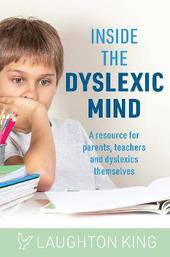
|
Inside the Dyslexic Mind: A resource for parents, teachers and dyslexics themselves
Paperback / softback
Main Details
| Title |
Inside the Dyslexic Mind: A resource for parents, teachers and dyslexics themselves
|
| Authors and Contributors |
By (author) Laughton King
|
| Physical Properties |
| Format:Paperback / softback | | Pages:256 | | Dimensions(mm): Height 229,Width 152 |
|
| Category/Genre | Child care and upbringing |
|---|
| ISBN/Barcode |
9781922539427
|
| Audience | |
|---|
|
Publishing Details |
| Publisher |
Exisle Publishing
|
| Imprint |
Exisle Publishing
|
| NZ Release Date |
26 April 2023 |
| Publication Country |
Australia
|
Description
Laughton King shares his understanding of the dyslexic mind from his own lived experience as a dyslexic child, an angry adolescent, a therapist and eventually an author. When describing what it is like to be dyslexic, he is includes himself. 'We think in pictures, we chase words around the pages of books, and we have trouble finding any sensible connection between squiggles on paper and real things they are meant to refer to. And this all happens in perpetual reverse gear. You guessed it, for us, school is not cool, and for most of us this makes life tough.' At the heart of this book is a ground-breaking concept - the diesel/petrol analogy. As Laughton describes it, a dyslexic person is like a diesel vehicle. They run perfectly if you give them the right fuel, but if you put petrol in the tank (i.e. expect them to learn like every 'normal' child in our current education system) they break down. This book helps dyslexic (diesel) thinkers make sense of their lives, and provides valuable guidance for parents and teachers. There is nothing wrong with the dyslexic child's brain. They do not need medication and do not need to be 'rewired' nor 'recalibrated'. Laughton's message to parents and educators is that once they accept this processing difference and understand the dyslexic style of thinking they can readily work with these children and help them achieve their own success.
Author Biography
Laughton King is a retired psychologist whose understanding of what is commonly called 'dyslexia' comes from his 70-plus years as a 'dyslexic' person, and from 35 years as a psychologist working with children experiencing learning difficulties.
|